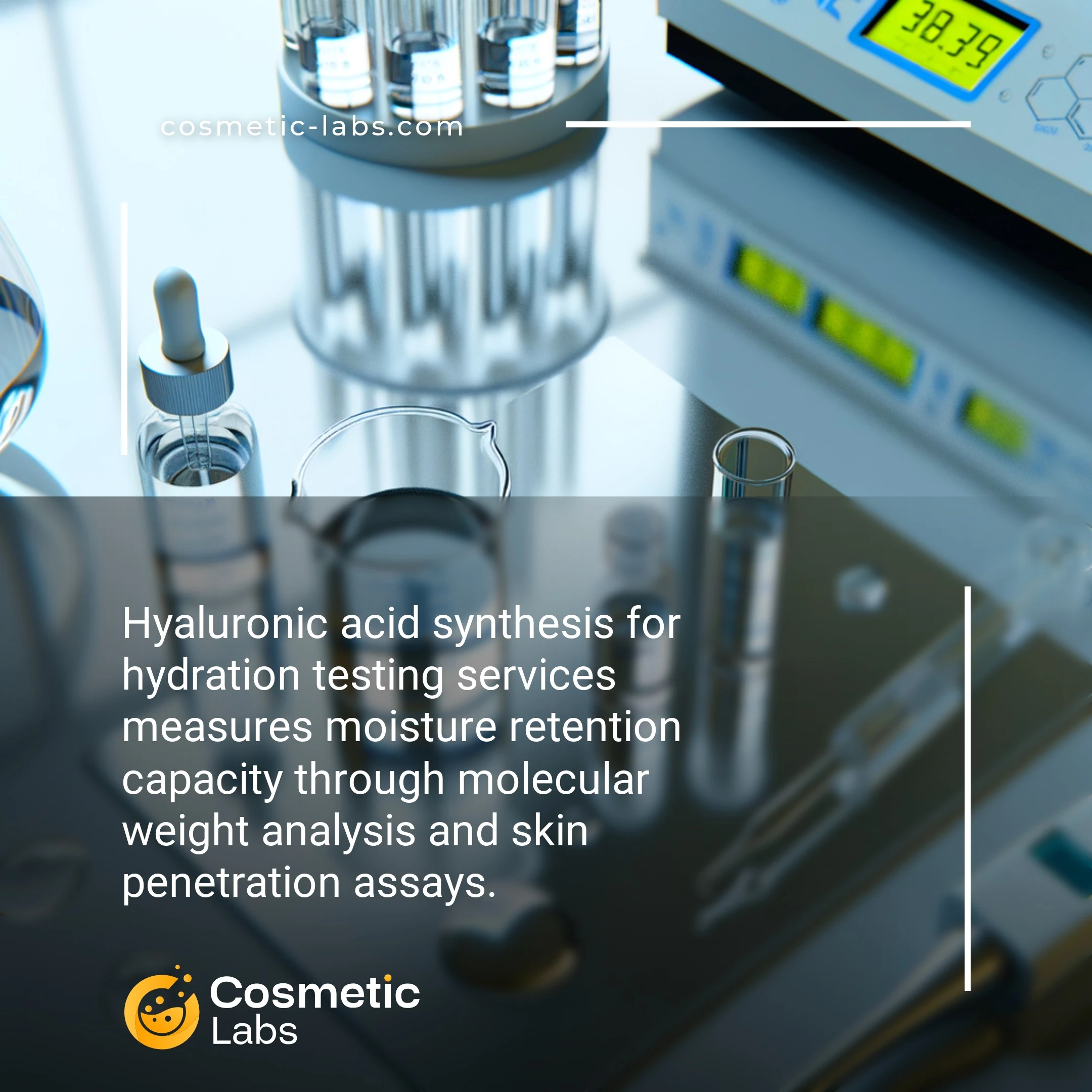Hyaluronic Acid Synthesis Testing for Skincare Hydration

What is Hyaluronic acid synthesis?
Hyaluronic acid synthesis hydration testing services evaluate how effectively your cosmetic formulations stimulate natural hyaluronic acid production in skin cells. Our partner labs use in vitro keratinocyte cultures to measure molecular weight distribution and concentration changes over 24-72 hour periods. This testing reveals whether your active ingredients actually boost the skin’s moisture-retention capacity, not just surface hydration levels.
Why do you need this service?
Cosmetic labs use synthetic hyaluronic acid testing protocols to validate moisture retention claims for serums, creams, and injectable formulations before market launch. These services measure water-binding capacity, molecular weight distribution, and biocompatibility through standardized assays that generate regulatory-compliant efficacy data for FDA submissions and consumer marketing materials.
Who provides Hyaluronic acid synthesis services?
All cosmetic labs providing Hyaluronic acid synthesis services
There is no company providing these services at the moment.
Hyaluronic Acid Synthesis Testing for Hydration Efficacy
Cosmetic labs measure how well your formulations boost natural hyaluronic acid synthesis in skin cells through specialized preclinical testing protocols. These assays determine whether your active ingredients actually stimulate cellular production of this moisture-binding molecule, providing concrete data for hydration claims.
Cellular Synthesis Measurement Protocols
Labs use keratinocyte and fibroblast cell cultures to test your formulations’ ability to trigger hyaluronic acid production. The process involves exposing cultured skin cells to your product samples at various concentrations over 24-72 hour periods. Technicians then measure hyaluronic acid levels using enzyme-linked immunosorbent assays (ELISA) or spectrophotometric methods.
Key testing parameters include:
- Dose-response curves at 0.1%, 0.5%, and 1% concentrations
- Time-course analysis at 24, 48, and 72-hour intervals
- Comparison against positive controls like retinol or vitamin C
- Cell viability assessments to confirm non-toxic effects
Enzymatic Activity and Gene Expression Analysis
Advanced labs also examine how your ingredients affect hyaluronic acid synthase enzymes (HAS1, HAS2, HAS3) responsible for molecule production. RT-PCR testing reveals whether your formulation upregulates these genes at the molecular level. This data strengthens efficacy claims by showing the biological mechanism behind increased synthesis.
Testing typically includes Western blot analysis to confirm protein expression changes and immunofluorescence microscopy to visualize cellular hyaluronic acid distribution. Results help you understand not just if your product works, but exactly how it triggers the skin’s natural hydration processes.
Partner with specialized cosmetic labs on our platform to access these sophisticated testing capabilities and validate your hydration claims with robust scientific data.
Applications of Hyaluronic Acid Synthesis for Hydration Testing Services
Cosmetic labs use hyaluronic acid synthesis for hydration testing services to validate moisture retention claims and optimize formulation performance across multiple product categories.
Anti-Aging Serum Development
Labs synthesize different molecular weights of hyaluronic acid to test hydration efficacy in anti-aging formulations. Low molecular weight HA (50-130 kDa) penetrates deeper skin layers, while high molecular weight variants (1,500-1,800 kDa) create surface moisture barriers.
Testing protocols measure transepidermal water loss reduction over 24-72 hour periods using corneometer readings. Labs typically achieve 15-25% hydration improvements with optimized HA concentrations between 0.5-2%.
Moisturizer Efficacy Validation
Cosmetic testing facilities synthesize cross-linked hyaluronic acid networks to evaluate long-term moisture retention in creams and lotions. These modified HA structures resist enzymatic breakdown and extend hydration duration.
Labs conduct comparative studies using skin replica analysis and capacitance measurements. Results show cross-linked HA formulations maintain 40-60% higher moisture levels after 8 hours compared to standard formulations.
| HA Molecular Weight | Penetration Depth | Hydration Duration | Primary Application |
|---|---|---|---|
| 50-130 kDa | Deep dermal layers | 6-8 hours | Anti-aging serums |
| 400-700 kDa | Mid-epidermis | 4-6 hours | Daily moisturizers |
| 1,500-1,800 kDa | Surface barrier | 2-4 hours | Instant hydration masks |
Connect with specialized cosmetic labs on our platform to access custom hyaluronic acid synthesis and hydration testing services for your product development needs.
